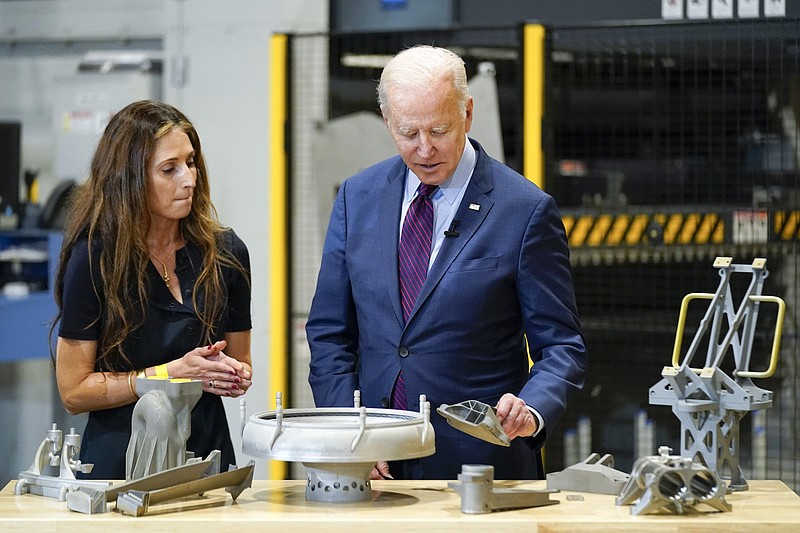HAMILTON, Ohio -- President Joe Biden traveled to the industrial Midwest on Friday to announce that five major U.S. manufacturers have made commitments to boost their reliance on small and medium American firms for 3D printing.
The White House said GE Aviation, Honeywell, Lockheed Martin, Raytheon and Siemens Energy have agreed to take part in the program, which Biden is highlighting with a visit to United Performance Metals in Hamilton. The president toured the factory with executives, making bold predictions about the future of U.S. industry that could be made possible through greater use of cutting-edge equipment and domestic manufacturers.
"It's going to revolutionize the whole world," Biden said during the tour.
The promise of 3D printing is that it could reverse the outsourcing of factory jobs and industrial production, allowing for more components to be manufactured in the U.S. An analysis by the consulting firm Kearney estimated that the technology could produce $600 billion to $900 billion in economic value by enabling more production domestically.
The president is pressing Congress to approve a stalled competition and innovation bill that the Democratic president says is critical to bolstering domestic manufacturing and helping solve a semiconductor shortage that has delayed production of life-saving medical devices, smartphones, video game consoles, laptop computers and other modern conveniences.
"I'm determined to make sure the United States holds the technological high ground in competition with other nations, especially China, as we move forward," Biden said this week. His comments on the Bipartisan Innovation Act came during a visit Tuesday to an Alabama Lockheed Martin plant building Javelin antitank weapon systems.
GE Aviation and Raytheon set a goal of looking to small and medium firms for 50% of their requests for quotes for products requiring 3D printing or related technologies.
Siemens Energy committed to targeting 20% to 40% of externally sourced 3D print parts and will work with 10 to 20 small and medium firms to help improve their capability. Lockheed Martin has agreed to work with smaller suppliers on research to improve the use of 3D printing as an alternative to castings and forgings. Honeywell is offering technical assistance, including part design, data generation, machine operation and post-processing, to small and medium suppliers it works with.
The semiconductor chip problem has been building since coronavirus pandemic-related lockdowns shut down major Asian chip factories more than two years ago. Now it could extend past this year, despite the semiconductor industry's efforts to catch up with demand.
There is bipartisan support for promoting domestic chip production, but lawmakers in the Senate and the House still need to negotiate over differences.
The House in February passed a version of the legislation that could pump $52 billion in grants and subsidies to the semiconductor industry to help increase U.S. production. The bill must now be reconciled with a Senate version passed eight months ago.
House Democrats also tucked in other priorities that have raised Republican concerns about the bill's cost and scope.
The bill includes $8 billion for a fund that helps developing countries adjust to climate change; $3 billion for facilities to make the U.S. less reliant on Chinese solar components; $4 billion to help communities with significantly higher unemployment than the national average; and $10.5 billion for states to stockpile drugs and medical equipment.
Information for this article was contributed by Kevin Freking of The Associated Press.
